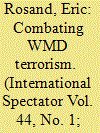| Srl | Item |
| 1 |
ID:
090640


|
|
|
|
|
| Publication |
2009.
|
| Summary/Abstract |
The Bush administration's strong preference for seemingly more flexible initiatives, involving a select group of countries, and limiting the size of international bureaucracies, which has resulted in three US-driven multilateral initiatives to address the threat of WMD-terrorism - the Proliferation Security Initiative, the G-8 Global Partnership Against the Spread of Weapons of Mass Destruction, and United Nations Security Council Resolution 1540 and the committee and group of experts it established - has produced mixed results so far. Although it helped to ensure a more rapid initial response to WMD terrorism, such an approach has also impeded efforts to build and sustain global support to respond to that threat
|
|
|
|
|
|
|
|
|
|
|
|
|
|
|
|
| 2 |
ID:
097680


|
|
|
|
|
| Publication |
2009.
|
| Summary/Abstract |
In this article an overview is provided of the terrorist threat and vulnerabilities in eastern
Africa, where all countries have been victimised by terrorism in one form or another,
and of the capacity of governments to respond.
The article highlights both the lack of sub-regional counterterrorism cooperation and
the emphasis that has so far been placed on the need for military, law enforcement, and
other security-related responses to the threat. It calls for a broader-based, long-term
strategy in eastern Africa not only to thwart and respond to terrorist attacks, but to
prevent the violent radicalisation of local populations which might resort to terrorism
in the future.
The article looks at the response at the sub-regional level and what has developed
into the primary mechanism for fostering deeper sub-regional cooperation, the
Intergovernmental Authority on Development's Capacity Building Programme against
Terrorism, and how these may be improved. It also examines how the United Nations
can help strengthen that cooperation and the opportunity offered by the UN Global
Counter-Terrorism Strategy. It argues that ICPAT, with its technical focus and relative
success to date, offers a solid foundation to improve counterterrorism cooperation in
eastern Africa and between the sub-region and the United Nations, and has a key role to
play in carrying forward implementation of the UN Strategy, serving as an interlocutor
between the sub-region and the international community.
It concludes that counterterrorism efforts in eastern Africa need to be grounded in the
needs and priorities of countries in the sub-region and that more must be done by key
counterterrorism donors, UN agencies, and others not only to enhance the securityrelated
capacities of countries in sub-region but to address the underlying conditions
conducive to the spread of terrorism there as well.
|
|
|
|
|
|
|
|
|
|
|
|
|
|
|
|
| 3 |
ID:
083090


|
|
|
| 4 |
ID:
080956


|
|
|
|
|
| Publication |
2007.
|
| Summary/Abstract |
This article focuses on the challenge of implementing the UN Global Counter-Terrorism Strategy in the Asia-Pacific region. The article starts with an analysis of the Strategy itself and then examines the nature of the threat facing areas within such a vast and diverse region. It then turns to the roles that relevant regional and sub-regional bodies and the different parts of the UN system can play in strengthening implementation. It also examines how the Strategy might be a vehicle for creating a more coherent regional response to the terrorist threat.
|
|
|
|
|
|
|
|
|
|
|
|
|
|
|
|